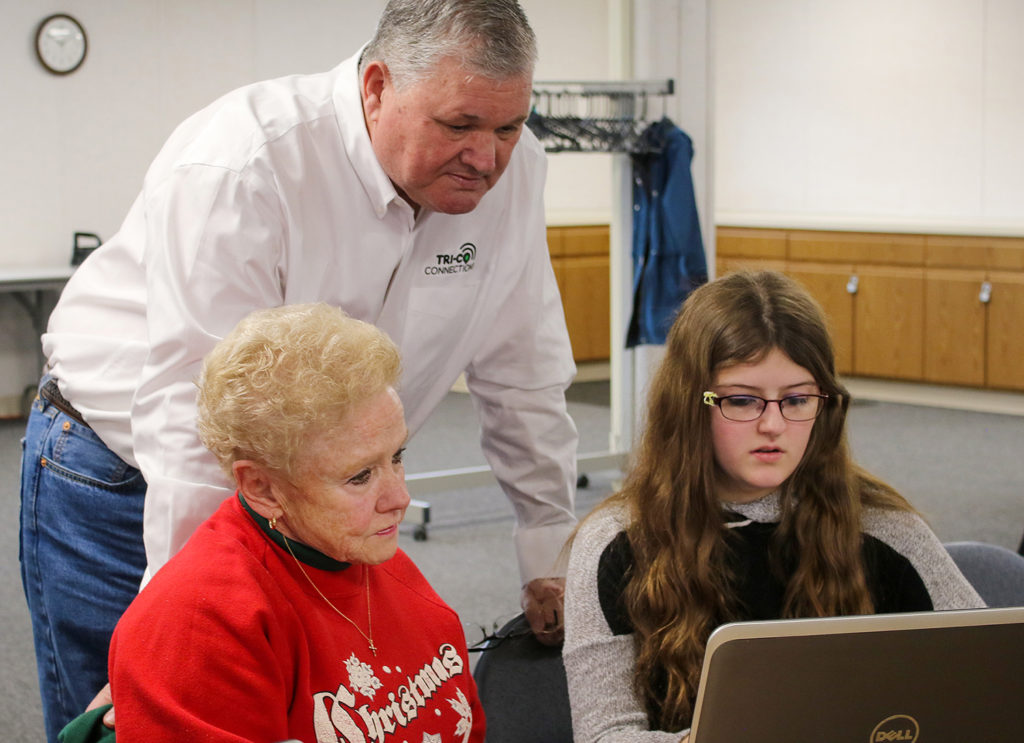
Bill Gerski teared up a little when he received the email greetings.
They’d been sent by local senior citizens, many of whom had just learned how to turn on a computer for the first time, thanks to an innovative program created by the broadband subsidiary of Tri-County Rural Electric Cooperative in Mansfield, Pennsylvania.
“I’ve never seen so many smiles,” said Gerski, the senior vice president of business development at Tri-Co Connections. “Now they are emailing their grandchildren. That’s what it’s all about.”
Dubbed Senior2Senior, the program was launched by Tri-Co last year to form classes where senior citizens are taught internet basics by tech-savvy high school seniors.
Tri-Co partnered with the Potter County Education Council, which coordinated the teenage volunteers, a local career and technical center and senior centers, where the classes take place. Local banks donated funds for computers and printers to get the classes going and to help seniors learn how to do their banking online.
With Tri-Co and Senior2Senior, “we have the technology, the broadband connection, and we have the opportunity to teach the skills necessary to everyone,” said Michele Moore, executive director of the Potter County Education Council.
About 40 people completed the eight-week course last fall, and another 20 were halfway through when the COVID-19 pandemic paused their progress.
Gerski says the ongoing health crisis, with its stay-at-home restrictions, has underscored how vital internet know-how is. Skilled seniors with online access can carry out necessary tasks like banking, shopping, telemedicine and visiting virtually with relatives, neighbors and friends. Some could even come out of retirement and work from home.
“There are seniors who would like to go to work and add income to their Social Security, but they have no computer skills,” said Gerski.
Tri-Co, which has received grants and loans to build broadband, connected its first fiber-to-the-home subscriber on April 7, becoming the only electric co-op subsidiary in the state to do so. Tri-Co has since hooked up 60 more homes. It plans to run fiber to all 22 of its substations and serve all its members in northcentral Pennsylvania over the next five to six years.
Tri-Co’s demographics are challenging and not unique among rural co-ops. The electric co-op serves 5.8 homes per mile, about half the national average. About 42% of its membership are seasonal. Another 40% are seniors—most of whom lack computer skills.
Gerski believes Senior2Senior can help solve the density conundrum required for affordable broadband by equipping retirees with the tools to take advantage of fast, reliable internet.
He said he welcomes calls from other electric co-ops that want to replicate Senior2Senior as they develop broadband in service territories where a large number of retirees reside.
“If we teach the senior members to use a computer, they will be broadband subscribers, and we will have happy members,” he said. “Everybody wins if our seniors know how to use a computer and have high-speed internet access.”
And that includes one 96-year-old student who described how people questioned why she was bothering to learn how to use a computer and get on the internet, said Moore.
Her answer?
“Well, I don’t want to be left behind. I want to be part of this.”
To learn more about Senior2Senior, please contact Bill Gerski at billgerski@tricoconnections.com
Cathy Cash is a staff writer at NRECA.